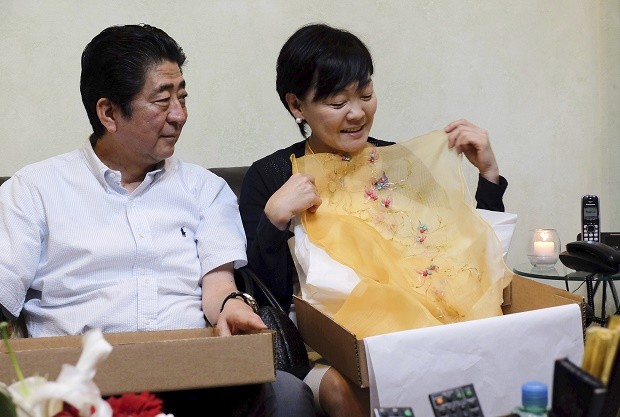
In this photo provided by Presidential Photographers Division Malacanang Palace, Japanese Prime Minister Shinzo Abe looks at his wife Akie admire a traditional women’s blouse given to her by Philippine President Rodrigo Duterte and partner Honeylet Avancena during their visit to the president’s residence at Dona Luisa Village in Davao City Friday, Jan. 13, 2017 in southern Philippines. Abe capped his two-day official visit to the Philippines by having a breakfast with Duterte in his house in Davao city. AP
SYDNEY — Japanese Prime Minister Shinzo Abe was in Australia on Saturday for talks with the nation’s leader on trade and regional security issues amid China’s growing military might in Asia.
Abe arrived in Sydney with his wife, Akie, and a business delegation on Friday night after a visit to the Philippines where he pledged $8.7 billion worth of business opportunities and private investments along with equipment to fight terrorism.
Australia is Abe’s second stop in a four-nation swing intended to boost Japan’s trade and security engagements amid concern over China’s emergence as a military power in the Pacific. After Australia, he visits Indonesia and Vietnam.
Australian Prime Minister Malcolm Turnbull said he was looking forward to meeting with his counterpart, dubbing him a good friend and noting that this year marks the 10th anniversary of Australia and Japan’s joint declaration on security cooperation.
“We are committed to advancing our economic, investment and trade relationship, our defense and security cooperation, and our common commitment to a secure and prosperous region,” Turnbull said in a statement.
While in Sydney, Abe will also meet with business and tourism leaders, tour a Japanese international school and visit the Royal Botanic Garden.
In the Philippines, Abe welcomed President Rodrigo Duterte’s efforts to boost ties with Beijing following the Philippines’ victory in an arbitration ruling declaring China’s claims to the South China Sea invalid.
READ: PH, Japan sign 5 agreements during Abe visit
China has refused to recognize the July arbitration decision and has warned the United States and other countries not to meddle in the disputes, which Beijing wants to be settled through one-on-one negotiations with other rival claimants, including the Philippines.
Abe, however, said “the issue of the South China Sea is linked directly to regional peace and stability and is a concern to the entire international community.”
Abe and Duterte witnessed the signing of a number of agreements and the exchange of documents, including a Japanese grant of 600 million yen ($5 million) for boats and other counterterrorism equipment for the Philippine coast guard.
RELATED STORIES